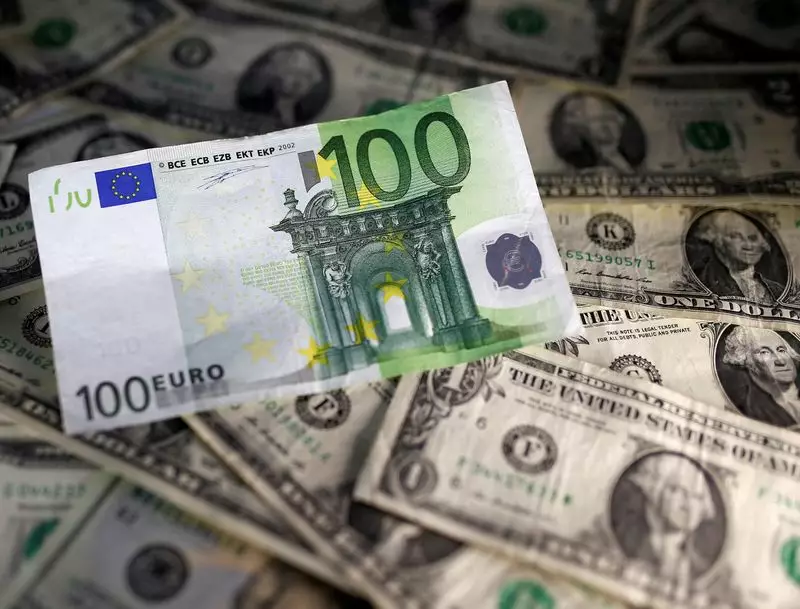On a turbulent Thursday in financial markets, the euro grappled with significant pressure following the anticipated downfall of the French government. As the second-largest economy within the European Union, the political instability in France raises grave concerns about the eurozone’s stability as a whole. The crisis was exacerbated by a no-confidence vote passed by French lawmakers, propelling the nation deeper into uncertainty. This tumultuous political landscape poses serious questions about governance and the effectiveness of legislative processes in addressing pressing economic issues, including France’s towering budget deficit.
The euro traded at around $1.052175, hovering just above a two-year low. This stagnation reflects anxiety among traders as they brace for a protracted political crisis in France, which could diminish business and consumer confidence significantly. Charlotte de Montpellier, an economist at ING, expressed concerns that the lack of a stable government may hinder critical fiscal decisions and prolong the uncertainty. The sentiment in the market has shifted towards apprehension, primarily due to fears of extended political deadlock in a country that is crucial to the eurozone’s economic framework.
Contrasting sharply with the euro’s plight, Bitcoin achieved a remarkable milestone by surpassing the $100,000 mark for the first time. The surge, driven largely by expectations of a favorable regulatory environment in the United States following Donald Trump’s election victory, demonstrates the growing attractiveness of cryptocurrencies to investors. Bitcoin reached an impressive high of $101,626 during Asian trading hours and was last noted at $100,882, marking a staggering year-to-date growth of 138%.
Kyle Rodda, a senior financial analyst at Capital.Com, articulated the ongoing positive momentum behind Bitcoin prices, citing diminished regulatory risks and heightened interest in non-fiat assets as key drivers. The political dynamics in the U.S. are likely mediating perceptions regarding traditional fiat currencies, further entrenching the appeal of cryptocurrencies like Bitcoin. Given this context, the ongoing geopolitical tensions only serve to fortify Bitcoin’s perceived value as a hedge against instability.
The critical role played by central banks in this evolving economic landscape cannot be overstated. In Europe, the European Central Bank (ECB) remains a focal point as market participants speculate about potential interventions should conditions worsen in France. Central Bank President Christine Lagarde’s comments indicate that while financial stability is pivotal, there are clear signs that growth in the eurozone may weaken. Consequently, traders anticipate a range of monetary easing measures, including a slew of interest rate cuts in the coming years.
Across the ocean, the United States presents a different monetary narrative, as investor sentiment for potential rate cuts remains surprisingly robust, despite the Federal Reserve’s apparent hesitation towards aggressive easing strategies. Federal Reserve Chair Jerome Powell’s acknowledgment of a stronger-than-expected economy suggests a careful balancing act in navigating interest rate policies. The focus now shifts to the significantly awaited non-farm payrolls report, anticipated to demonstrate substantial job growth in November, particularly after October’s alarming figures.
In the Asia-Pacific region, the South Korean won displayed remarkable stability amid a backdrop of political upheaval, particularly after President Yoon Suk Yeol’s controversial declaration of martial law. The economic ramifications of such political maneuvers have placed the won in a precarious position, intensifying market volatility. With South Korea’s government pledging substantial market stabilization funds, confidence remains tenuous; the won lingered near two-year lows against the dollar, with prospects of a difficult recovery.
Conversely, the Japanese yen experienced slight strength as dialogue intensified around possible interest rate hikes by the Bank of Japan later this month. Market speculation turned towards the possibility of a rate increase, highlighting the varying monetary policies among Asian economies at a time when global financial markets are sensitive to both geopolitical and economic shifts.
The divergent narratives of the euro’s political struggles and Bitcoin’s meteoric ascendance illustrate the complex dynamics at play within global financial markets. While the eurozone faces profound uncertainties that could hinder economic recovery and growth, the juxtaposition of Bitcoin’s rise signals a growing appetite among investors for alternative assets amidst rising geopolitical tensions. Navigating these turbulent waters will require astute observation and strategic decision-making, as both political developments in Europe and regulatory changes in the U.S. will likely shape the course of markets in the months ahead. As players in the financial sphere brace for volatility, the importance of understanding these multifaceted interactions remains paramount.

